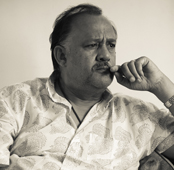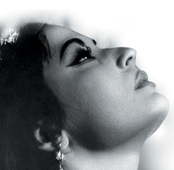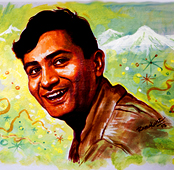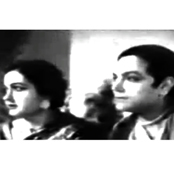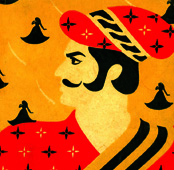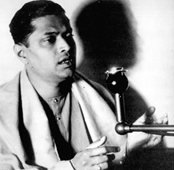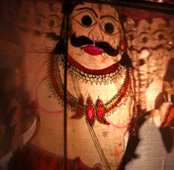-
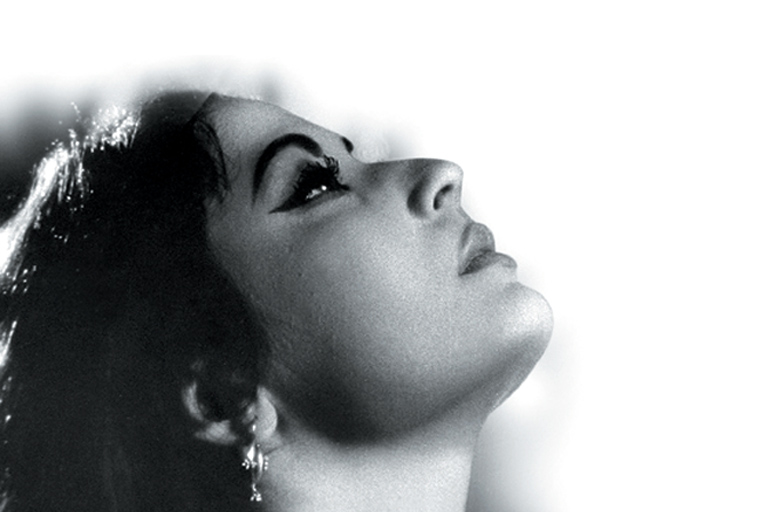 Image Courtesy: Roli Books
Image Courtesy: Roli Books
Here is TBIP’s pick of five Urdu poems by the actress Meena Kumari, with an introductory note from their translator Noorul Hasan.
Meena Kumari needs no introduction. As a matinee idol and diva of the mid-twentieth century, and despite her untimely death in 1972, at the age of thirty-nine, she remains a legendary heroine of what is known as the golden age of Hindi cinema. It’s not for me to elaborate that point.
However, not many know that she had a way of her own with the pen as well. Soon after her death, Gulzar sahib arranged for Hind Pocket Books to publish a collection of her poems. I chanced upon this slim paperback volume at the Howrah Railway station the same year and have had the pleasure of dipping into that now more than moth-eaten prize paperback for over three decades.
What struck me most about the poems was their amazing immediacy, their power to take you in without any fuss and bother. Plain as conversation Meena Kumari’s poems strike an uncanny intimacy or rapport with the reader. Her imagination hovers over a wide range of subjects from the very personal and idiosyncratic to the more objective though equally heartrending, as expressed in poems like ‘The Dumb Child’ or the ‘Empty Shop’. Hers is an art without artfulness. The sheer audacity of her statements is the raison d’être of her poetry. Her unadorned, screaming verse reminds me of snatches of Donne, Firaq, Wordsworth, and Ghalib. This is not to say that she is anywhere near the dizzying heights scaled by that august fraternity. Her poetry is slight, casual, a kind of intermittent adventure or a holiday she allowed herself from her self-consuming stardom.
As a poet she resembles her screen persona, coming across as a wayward, sensuous, sacrificial lamb kind of woman. Her imagery is soaked in the immemorial customs and traditions of an ageless India. Her voice is very often the tremulous, quavering voice of an invincible Indian woman in the direst of straits. She writes the poetry of ‘some natural sorrow, loss or pain/that has been and may be again’, of ‘some old, unhappy, (not) so far off things’, if you know what I mean. The overwhelming impression one is left with after reading this poetry is, in Firaq’s unforgettable words, ‘Maine is aawaz ko mar mar ke pala hai…’. She is a poet because she has an inimitable personal voice.
I never planned to translate her into a language she would have thought so far removed from her field of light. I used to see the odd poem of hers translated into English in lifestyle magazines or poetry journals. Initially I translated some as an experiment and after several readings I began to feel that there was something of the cadence and clarity of the original in those random translations. So I decided to translate as many as I could. It was very kind of the poet Jayanta Mahapatrara to have published a number of these translations in his journal Chandrabhaga (12/2005) with the kind permission of Gulzar sahib. It’s a strange coincidence that translations of some of Gulzar’s own lyrics appeared in the same issue of Chandrabhaga as well.
In trying to put these translated poems together in a volume I hope to contribute to conveying another image of Meena Kumari which deserves as universal an acknowledgement as her immortal image as the queen of the Bollywood firmament of yesteryears. Her flirtations with the pen are as seductive as her universally celebrated femininity and resourcefulness as an iconic Indian woman actor in film after unforgettable film for nearly three decades during which she could slip with ease and spontaneity from the role of a skittish Miss Mary to that of the soulful and haunting Pakeezah.
A chameleon actor she is, equally spontaneously, a ‘chameleon’ poet.
—Noorul Hasan
Ma’zi aur Ha’l
Har masar’rat
Ek barba’d shuda gham hai
Har gham
Ek barba’d shuda masar’rat
Aur har tariki ek tabah shuda raushni hai
Aur har raushni ek tabah shuda tariki
Isi tarah
Har ‘ha’l’
Ek fana shuda-ma’zi hai
Aur har ‘ma’zi’,
Ek fana shuda ha’l
Past & Present
Each happiness
Is a devastated grief
Each grief
A devastated happiness.
And each darkness is a raped light
And each light a raped darkness.
Likewise
Each present
Is an annihilated past
And each past
An annihilated present.
Aaj ka Insan
‘Ideal insan’ kitabo’n ki
Zakheem jildo’n ke waqt khurda safhat ki
Mahdood dunia mein muqaimad hai
Woh
Bahar ki dunia mein qadam nahin rakh sakta
Bas,
Apne boseeda workon ke jharokhe se
Tumhen dekhta hai
Ishar’e karta hai
Aur
Tumhen aziat mein jhonk deta hai
Man Today
The “ideal man” is imprisoned
In the closed world
Of the time-torn pages
Inside the hard covers
Of books.
He does not step out
Into the world
Just
Peers at you
From the cracks
In his tattered pages
And says
“Go to Hell”.
Suhani Khamoshi
Kabhi aise pursukoon lamhat bhi ayenge
Jab
Mai’n bhi usi tarah so jaungi
Woh khamoshi
Kitni suhani hogi
Maut ke ba’d
Agarche mahaz khala hai
Sirf tariki hai magar
Woh tariki
Is karb – angez ujale se
Yaqeenan behtar hogi
Kyonki
Mai’n
Un zindagion mein si hun jinhen
Har subah nihayat qaleel si raushni milti hai
Um’meed ki itni – si kiran ki
Sirf din bhar zinda rah saken
Aur jis din
Yeh raushni bhi na mil saki to – ?
Enchanted Silence
There will be a day
Of such tranquility
I shall instantly go to sleep
That stillness
Will be so enchanting
Even though
There is just a void
After death
Nothing but darkness
But that darkness
Should still be better
Than this precarious light
For
Mine is one of those lives
Lit by a measly light
Each morning
Barely enough
To last the day
And the day
Even this light plays truant
Then…?
Ghazal
Tukr’e-tukr’e din beeta, dhaj’ji-dhaj’ji ra’t mili
Jiska jitna anchal tha, utni hi saugat mili
Rimjhim-rimjhim boondo’n mein, zahr bhi hai aur amrit bhi
A’nkhe’n han’s di dil roya, yeh ach’chi barsat mili
Jab chaha dil ko samjhe’n, han’sn’e ki a’waaz suni
Jais’e koi kahta ho, lo phir tum ko ma’t mili
Mate’n kaisi ghate’n kya, chalt’e rahna aath pahar
Dil-sa sathi jab paya, bechaini bhi sath mili
Honto’n tak aate-aate, jan’e kitn’e roop bhar’e
Jalti-bujhti a’nkho’n mein, sadi si jo ba’t mili.
Ghazal
The day passed in fragments, followed by a tattered night
As far as you can spread your cloth, that’s your share of light.
The pattering raindrops are honey too, are poison
What a monsoon! My eyes were smiling, my heart cried
Whenever I try to hear my heart, there comes a mocking laugh
As though someone were saying: look, you’ve been defied.
Despite defeats and betrayals, I press on undeterred
When your heart is your companion, agony is your right
It took so many different forms before it could be spoken
The utterly simply thing in your cold yet smouldering eyes.
Chalo…
Chalo kahin chale’n
Ghoomti hui sarak ke kinare
Kisi mor par
Raushni ke kisi khambhe ke neeche baith kar
Bate’n karen
Chalo, kahin chalen
Apne-apne mazi ke
Nuche ghute gharaudon se doo’r
Kisi sookhe nal’e ki pulia par baith kar
Bate’n karen
Chalo, kahin chalen
Darawne jangal ki andheri pagdandion par
Ratjaga manayen
Zindagi ke har marhale par bahas karen
Jhagren
Dher sari bate’n karen
Chalo kahin chalen
Chalo kahin chalen
Chalo!
Let’s Go
Let’s go somewhere
To some edge of the revolving road
And sitting
Under the shade of some
Pillar of light
Let’s talk
Let’s just go somewhere
Far from the ravaged shanties
Of our past
Just sit on the culvert
Of some dry canal
And talk
Just let’s venture out
And sitting on the pathways
Of the forests of the night
Let’s spend the entire night
Discussing all the imponderables of life
Quarrel
Talk our hearts out
Just let’s go somewhere
Come on! Be a sport
Let’s go.
Excerpted from Meena Kumari the Poet: A Life Beyond Cinema, courtesy of Roli Books. You can buy the book here.
Also read Inhi Logon Ne, on Meena Kumari and all that was lost with her here.
The Song in Her Heart
SpecialJuly 2014



